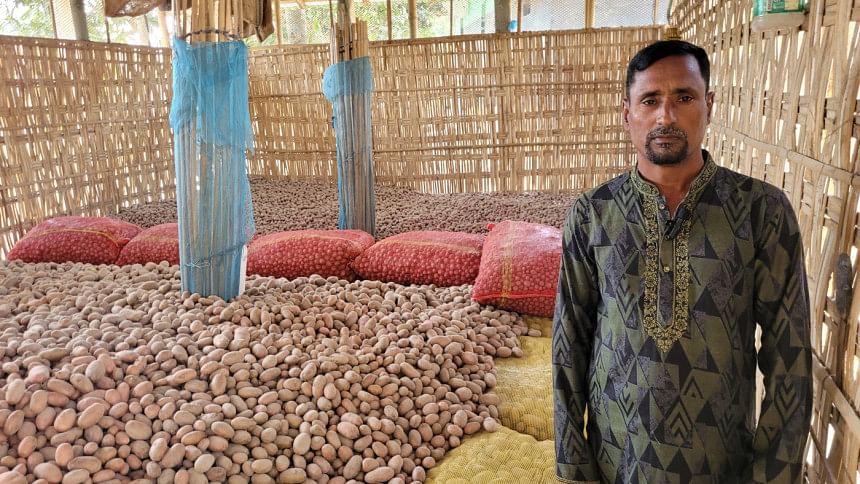Potato farmers' plight needs long-term solutions

While living in the cities, attending rallies and back-to-back meetings on "sangskar" (reform), it is hard to feel the heat of the ongoing crisis potato farmers are facing. Moreover, we, the self-declared "opinion builders," can't see any immediate change in potato prices, as they remain very low at present.
Potatoes are Bangladesh's second-biggest crop after rice. They are regarded as a safe crop in our low-lying South Asian country as it is planted in October and harvested by the end of February when the land is still dry.
It also contributes to our food security basket. Experts see potatoes as a potential antidote to hunger caused by higher food prices, global population growth rate, climbing costs of fertiliser, and reduced cropland. United Nations termed potatoes a "hidden treasure" and proclaimed 2008 the "International Year of the Potato." Asian countries are seeing potatoes as a possible salvation as they scramble to feed their people at reasonable prices in the near future.
The per-person annual consumption of potatoes has increased in Bangladesh also, although it is still consumed as a side dish or just a vegetable. According to agriculture officials, the consumption of potatoes has risen from an average of seven kilos per capita in 1991 to 24 kilos in 2007 and 53 kilos in 2022.
In April 2008, the then army chief General Moeen U Ahmed, started preaching—"think potato, grow potato and eat potato,". With his patronage and enthusiasm Dhaka experienced a grand three days' potato festival.
Bangladesh experienced crop failure that year and rice prices went up every day if not every hour. A significant number of people had to skip one or two meals a day because they could not afford to buy rice which forms the bulk of their diet.
So, he and his civilian entourage started a potato campaign. The aim of the campaign was to convince millions of Bangladeshis to embrace potatoes as a staple food instead of high-priced rice and wheat. Fortunately, that year we had an unusually good crop of potatoes, which needed to be eaten quickly before they rot.
This year Bangladesh is facing almost the same scenario. Rice prices are going "up above the world so high" and the crop is gradually becoming the "diamond in the sky." In recent weeks, the price of the most popular rice (Miniket) has increased by about Tk 5 per kg. In Kushtia, the price increased by Tk 7 per kg in 14 days. On the other hand, potato farmers are protesting on the street for space in the cold storage.
Predicting good potato yield and the crisis of space in the cold storage, the Bangladesh Cold Storage Association (BCSA) increased the storing rate and imposed different embargos. According to the Agricultural Marketing Act, 2018, the rent of cold storage must be increased or determined through a government gazette in consultation with the director general of the Department of Agricultural Marketing. However, the BCSA announced an increase in potato storage fees in a press conference on February 8 without any gazette. The storage fee was set at Tk 8 per kg, up from Tk 5. Farmers also have been asked to keep the sacks at a maximum of 50 kg. Earlier, farmers used to keep 70 kg sacks in cold storage for Tk 350.
The cold storage owners are also giving priority to businessmen over farmers when it comes to storing. Farmers are harassed when it comes to obtaining so-called booking slips which are permits to store potatoes. Most farmers are worried about how much produce can ultimately be saved from rotting by storing potatoes in cold storage. Farmers are now selling their potatoes right from the field at a low price due to a lack of storage opportunities. While farmers spent Tk 22 to 25 on producing one kg of potatoes, now they have to sell the crop for just Tk 14 per kg or less directly from the fields. If the government does not anticipate the ashoni songket (bad news) i.e. the imminent danger to the food security situation and the farmers' losses in one crop after another, the nation will head nowhere. Should thousands of farmers face losses due to the syndicate of cold storage owners?
In several countries of Southeast Asia and different states of India, special types of houses are built in farmers' homes to store potatoes for long periods. With the active interest of the Food and Agriculture Organization (FAO) of the United Nations, the Department of Agricultural Marketing built several such houses in the potato-producing areas in the 2023-24 fiscal year. According to the department, it is a scientific mini-cold storage. Storing 25 to 30 metric tonnes of potatoes in such houses will save the farmers about Tk 1.5 lakh per year. I have visited and talked with some users and found that these houses serve as dependable alternatives.
If you build such a storehouse, you can use it for up to 15 years. Each house costs Tk 1.5 lakh to build. Potatoes can be stored in these houses for four to six months. If the government doesn't have money, FAO can invest more in this successful project. The farmers said that if they get loans on easy terms, they will build their own houses. Can microfinance organisations not come forward?
The Indian state of West Bengal also faces a similar crisis but they have taken several initiatives to protect the farmers. We need to examine those initiatives for the sake of our food security.
Gawher Nayeem Wahra is a researcher and writer. He can be reached at [email protected]
Views expressed in this article are the author's own.
Follow The Daily Star Opinion on Facebook for the latest opinions, commentaries and analyses by experts and professionals. To contribute your article or letter to The Daily Star Opinion, see our guidelines for submission.

 For all latest news, follow The Daily Star's Google News channel.
For all latest news, follow The Daily Star's Google News channel. 










Comments